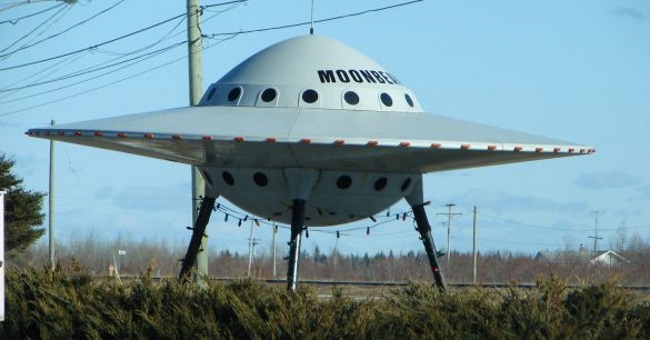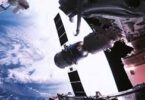Matt Haines
Logistics manager Nicholas Rehak was visiting his parents’ home in Baltimore County, Maryland, several years ago. He was standing on the back deck one night when he noticed a bluish white light. “It was shaped in a damn near perfect oval and it started to rise,” Rehak told VOA. “I’m talking straight up vertical, no deviation. It sat there for nearly 30 seconds and then suddenly it vanished – like a lamp when someone pulls the plug. Just sudden darkness.”
Perhaps it was a drone. Rehak said that was his first thought. “But I’ve never seen a drone take off perfectly vertical like that, from ground to sky without so much as a wobble,” he continued. “It was far too low to the ground to be a larger aircraft. So what was it? If I close my eyes, I can still see the light plain as day.” For decades, Americans have reported sighting unidentified flying objects – commonly referred to as UFOs – zigging, zagging and hovering in the sky. Many were ridiculed for their assertions. Now, however, the US government is tracking and studying reports of what they refer to as unidentified aerial phenomena (UAP). More than 350 new cases have been reported to the government since March 2021, according to an unclassified document released last month by the Office of the Director of National Intelligence. That number far exceeds what was reported over the 17 years prior, suggesting either a dramatic increase in sightings or a greater willingness to report them.
“It’s no longer embarrassing to talk about,” said Steve Mort, a New Orleans, Louisiana, resident. “I’ve always known true extraterrestrial UAPs exist – they’re likely our ancestors checking back in on us. The only thing I’m shocked by is that the government is officially confirming this.” The January report, however, cautions against making such conclusions. While approximately half of the 366 reported UAP sightings remain unexplained, the ODNI wrote its “initial characterization does not mean positively resolved or unidentified.” In other words, the US government says it does not know what many of the mysterious objects are. And while the Department of Defense and NASA are taking steps to investigate UAPs, an impatient and imaginative American public is debating the mystery on its own.
Many in the scientific community say there is nothing particularly unusual about the steps the government is taking. This includes American astrophysicist Neil deGrasse Tyson. “If there’s something in your night sky and you don’t know what it is, maybe it’s harmful, right?” Tyson said, speaking with VOA. “Well, investigating that potential harm is the entire mission statement of the military.” “It’s nothing deeper than that,” he continued, “other than there are many people out there who wish it was something deeper despite having a lack of evidence to prove it.” While there is a wide variety of opinions on whether extraterrestrial life has visited Earth, there appears to be a consensus that life likely exists beyond Earth.
According to a survey conducted by the Pew Research Center in June 2021, 65% of Americans say they believe intelligent life exists on other planets. “Each time we build a bigger telescope, we discover more and more galaxies in our ever-expanding universe,” said Robert Sheaffer, an author and investigator of UAPs. “Our universe is so unimaginably vast, it would be foolish to claim there are no other planets with life, or with intelligent civilizations.” Americans as a whole appear divided on whether UAPs are extraterrestrial spacecraft visiting our planet. But the percentage who do believe in alien visitation has grown. A YouGov survey last September found 34% of Americans believe UFOs are alien ships or alien life forms. An equal percentage said they didn’t know what accounts for UFOs while 32% believed they had a natural scientific explanation. In a similar survey by Newsweek/Princeton in 1996, only 20% of Americans believed UFOs were evidence of extraterrestrial life while 51% said they could be explained by natural science.
Tyler Ogilvie, a musician from Syracuse, New York, said he recently spotted a mysterious spacecraft zooming overhead. “I was legitimately convinced I was seeing something mystical or otherworldly,” he told VOA. “It was incredible … until a sobering Google search proved otherwise. It turned out I was looking at Elon Musk’s Starlink [a series of satellites launched by SpaceX to provide broader internet access].” “But I think it’s a valuable experience,” Ogilvie added. “I learned how quickly the human mind can be convinced of something that it wants to believe is true. I want to believe it because I think it would make more sense out of our seemingly meaningless existence if we could put it into the perspective of the universe as a whole.” Others agree.
“I think we don’t want to be alone,” Nicholas Rehak said. “It gives me goosebumps to dream of what might be out there,” said Carl Fink, a software developer in New Orleans, “and contemplating the cosmos helps me consider the possibility of things I couldn’t previously imagine.” Tyson said imagining life in other parts of the universe is part of a longer trend in human history. “We used to think our planet was the center of the cosmos, but then through the help of Galileo and others we learned we orbit a sun,” the astrophysicist explained. “But at least everything in the universe orbited our sun … until we learned it didn’t. We’d go on to learn that other stars in the galaxy have their own planets, and that, in fact, there are hundreds of billions of other galaxies in our universe and we’re not at the center of anything.”
He added, “It’s good for our ego to understand that the universe literally doesn’t revolve around us and that we’re probably not the only life form out there.” Are the UAPs being reported to the US government in record numbers proof that alien life forms are finally reaching out? Tyson is a skeptic. “You’re telling me that a million humans are airborne at any given time – with cellphones that can take photos and capture video – and none of us have gotten clearer footage of these supposed alien spacecraft?” he said. “We have the technology to livestream these encounters, so where is the evidence? I know, I know. Everyone wants to meet the aliens, but for me – and I don’t want to stop anyone from investigating the lights in the sky, of course – there’s not enough evidence of visiting aliens to pique my interest.”
The Pentagon office responsible for tracking and studying sightings has preliminarily identified 163 of the recent reports as “balloon or balloon entities” while others have been attributed to weather events, birds, drones, or airborne debris such as plastic bags. Still, 171 other reported sightings since March 2021 remain unexplained. Are they aliens? Foreign governments spying on America? Secret US weapons tests? “UAPs can be anything,” said Emily Songster, a music teacher in Asheville, North Carolina. “But imagining the possibility of life on other planets coming to visit us makes for a more fun and interesting world. I think that’s why many people look to aliens for answers and, personally, I’m glad we’re beginning to officially take these things seriously.”
VOA







